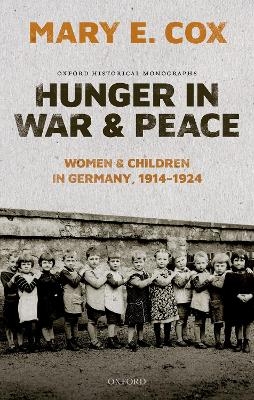
Hunger in War and Peace
Oxford University Press (Verlag)
978-0-19-882011-6 (ISBN)
At the outbreak of the First World War, Great Britain quickly took steps to initiate a naval blockade against Germany. In addition to military goods and other contraband, foodstuffs and fertilizer were also added to the list of forbidden exports to Germany. As the grip of the Blockade strengthened, Germans complained that civilians-particularly women and children-were going hungry because of it. The impact of the blockade on non-combatants was especially fraught during the eight month period of the Armistice when the blockade remained in force. Even though fighting had stopped, German civilians wondered how they would go through another winter of hunger. The issue became internationalised as civic leaders across the country wrote books, pamphlets, and articles about their distress, and begged for someone to step in and relieve German women and children with food aid. Their pleas were answered with an outpouring of generosity from across the world. Some have argued, then and since, that these outcries were based on gross exaggerations based more on political need rather than actual want. This book examines what the actual nutritional statuses of women and children in Germany were during and following the War. Mary Cox uses detailed height and weight data for over 600,000 German children to show the true measure of overall deprivation, and to gauge infant recovery.
Mary Elisabeth Cox is a William Golding Fellow in the Arts, Humanities, and Social Sciences at Brasenose College, Oxford University. She is also a British Academy Postdoctoral Fellow, and serves as a Visiting Fellow at the Hoover Institution, Stanford University. Her research focuses on food insecurity, living standards of civilians during wartime, and the development of relief institutions during the early 20th century.
Introduction
1: The First World War and the Blockade of Germany, 1914-1919
2: The Market for Food
3: Nutritional Deprivation in Urban Leipzig
4: Were Rural Germans Better Off Than Urban Citizens During the War? The Case of Straßburg
5: Nutritional Deprivation of Children Across Germany
6: Armistice & Blockade: November 1918-July 1919
7: Living Standards after the Fighting: November 1918-July 1919
8: From Blockade to Aid: July 1919-1924
9: German Children's Response to Aid
Epilogue
| Erscheinungsdatum | 26.06.2019 |
|---|---|
| Reihe/Serie | Oxford Historical Monographs |
| Zusatzinfo | 150 black and white figures/illustrations |
| Verlagsort | Oxford |
| Sprache | englisch |
| Maße | 145 x 221 mm |
| Gewicht | 700 g |
| Themenwelt | Geschichte ► Allgemeine Geschichte ► Neuzeit (bis 1918) |
| Geisteswissenschaften ► Geschichte ► Regional- / Ländergeschichte | |
| Geschichte ► Teilgebiete der Geschichte ► Kulturgeschichte | |
| Sozialwissenschaften ► Soziologie ► Gender Studies | |
| ISBN-10 | 0-19-882011-9 / 0198820119 |
| ISBN-13 | 978-0-19-882011-6 / 9780198820116 |
| Zustand | Neuware |
| Haben Sie eine Frage zum Produkt? |
aus dem Bereich


